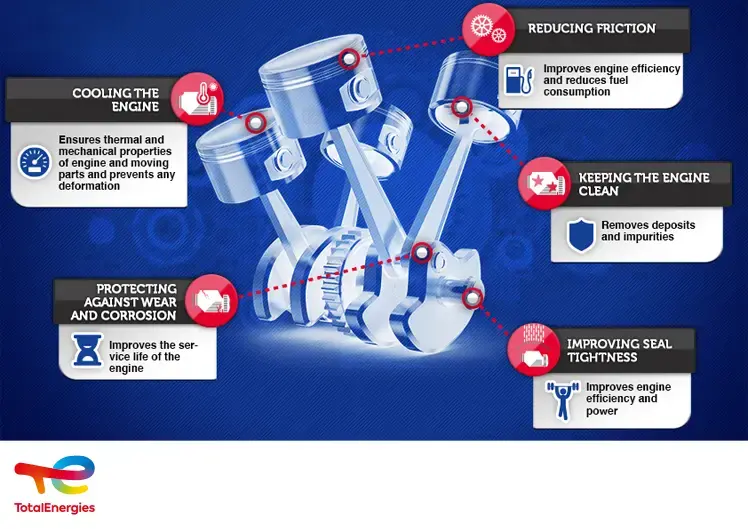Published Date - 15th April 2020
The metal parts of your engine suffer the effects of friction as they rub together. This generates heat and leads to premature wear. It's a bit like water-skiing. The buoyancy of the water helps you to glide across the waves more easily. The same principle applies to the lubricant inside your engine. The engine oil helps to reduce the effects of friction between the moving parts. As a result, they wear out more slowly and do not heat up. The oil reduces the amount of friction, which improves the performance of the engine and also reduces its fuel consumption.
But that's not all. Your oil protects your engine against corrosion and acid attacks. It also helps to reduce the temperature of your engine.
Finally, it removes any impurities that may accumulate over time (soot, dust and wear debris), which maintains the performance level of your engine.

Role of Engine Oil
The right engine oil enables a healthier and longer engine life. Engine oils are crucial in the smooth running of engines, reducing fuel emissions and improving engine performance. There are innumerable roles engine oils play to ensure your engine performs well. Here are a few of the major ones:
Provides Better Lubrication: Engines are exposed to different temperatures that result in gradual wear and tear. The primary role of engine oils is to ensure engines are lubricated properly, so that they run smoothly, and have a longer lifespan.
Maintains a Cleaner Engine: Cleaning is an important role that engine oil plays for your engine. It clears the accumulated deposits, sludge, and microscopic debris from the engine and in turn unclogs it, so that the engine oil can flow well. Delivers Effective Cooling: With regular use of your vehicle, exposure to high temperatures, and the friction of the mechanical parts, your engine tends to heat up. The lubrication provided by engine oils helps to cool your engine circuit.
Protects it from Corrosion: Fuel combustion causes metal parts to oxidize and rust with time. The additives in engine oils help to slow down the process of corrosion, thereby giving your engine a longer lifespan.
Acts as a Seal: Engine oils provide space between the piston and cylinder. These gaps are filled by the engine oils to optimize engine performance and efficiency.
Benefits of Engine Oil
Using good quality engine oil has the following benefits:
Longer Engine Lifespan: Since, engine oils clean, cool and prevent the engine from corrosion, they save it from being clogged and damaged. Mechanical parts last longer and corrode less due to that and in turn, engines have a longer and healthier lifespan.
Smooth Running of Engine: When engines are oiled well, they perform better. Hence, regular oil changes are advised to enjoy the best of your engine. Decreases Fuel Consumption and CO2 Emissions: If an engine is overused or its level is too low, the friction caused between metal parts affects the engine’s efficiency and increases fuel consumption. When you use a good engine oil, reduction of pollution and fuel consumption is achieved.
Finding the right engine oil for a vehicle is a vital step to getting the benefits of engine oil. Go through your owner’s manual and take advice from a professional or the automotive manufacturer to be informed about the same.
For engine oil to truly serve all its purposes, the level must be checked regularly to change the oil at the right time. Overused oil doesn’t play its role effectively, which is harmful to the general condition of the engine and its parts.
Discover our Range
Engine Oils
Composition of an Engine Oil
Mineral, synthetic or semi-synthetic, what are engine oils composed of? Let’s take a closer look at what goes into this essential lubricant, and what role do the additives perform.

Ways to check and change your engine oil
To make sure your engine runs smoothly, it is essential to ensure that your engine oil is checked and changed regularly. We’ve listed down the steps required, to help you check and change your engine oil